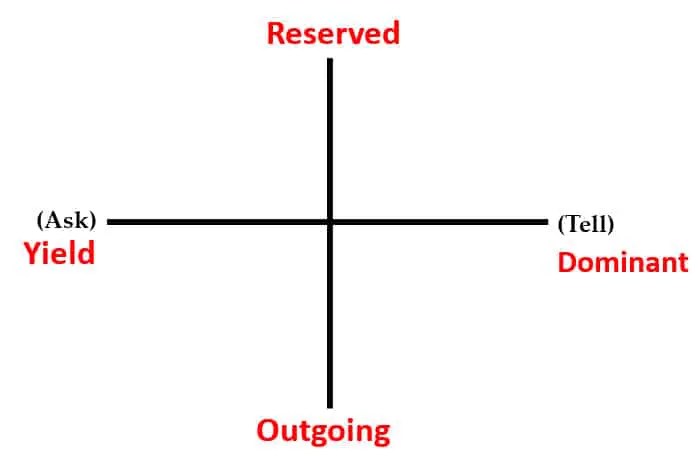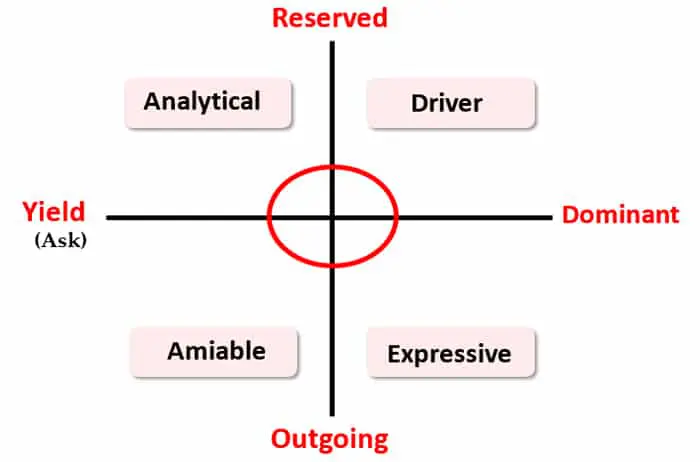
Understanding Behavior Styles will help you understand your style of behavior and the style of others. It will help you manage relationships in your workplace AND at home. These Behavior Styles are not designed to change a person. It is a tool for building productive relationships.
Try this Assessment test
You can take the “ What is Your Personality Style?”
The model is based on four style types:
• Driver
• Expressive
• Analytical
• Amiable
Explanation of how to understand the scoring:
• For each situation, select a number for each answer. Use the number 1 for the response that is most like you and the number 4 for the situation that is least like you. Then assign the numbers 2 and 3 to the other responses for that situation.
• You must provide a number for each answer, and each answer must have a different number.
For example:
When I see chocolate:
3 – I close my eyes and pray.
1 – I eat it before anyone can see.
4 – I offer it to my husband.
2 – I hide it for later.
• After assigning numbers to all the answers, place the numbers for each situation in the appropriate space at the bottom of the page.
• Total each column.
Your lowest score will be your dominant style.
Keep in mind:
To better understand the different styles, it is important to keep in mind that the behaviors represented are neutral. There are no strong, weak, effective, or ineffective styles. There is just observation and then a choice on how you want to interact with the different styles.
Once you complete the self-assessment you can read the explanation below to understand more about each personality type and behavioral style.
What is a social style?
A social style is a particular pattern of actions which others can observe and agree upon for describing a person’s behavior. What you’ll find today is that you’ll have a tendency to fall into one of the four social styles. Each style has a pattern of actions that can be observed, described, and agreed upon by others for describing a person’s behavior. If you have a greater awareness of your style, and those around you, you will be able to communicate with others more effectively.
Having an awareness of your style and having the skill in determining the style needs of others will improve your effectiveness to communicate with everyone.

The 4 dimensions of the Behavior Styles are the tendency to dominate or yield to others and the tendency to be socially reserved or outgoing. There is no right, wrong, good or bad place to be on the scale. Each has its own aspects and liabilities. Think of your boss. Where would you put him or her on the scale? Is he/she more or less reserved that you? People who are on the yield side of the scale tend to ASK questions whereas people on the dominant side of the scale TELL people rather than ASK.
The Assertive Scale
The assertive scale is determined by the degree to which a person is seen as attempting to influence the thoughts and actions of others.
| Tendency to Yield Suggests Cooperative Slow paced Minimizes risks Goes along Asks questions | Tendency to Dominate Directs Competitive Fast paced Takes risks Takes charge Makes statements |
The Sociability Scale
The sociability scale is determined by how you show or hide feelings in interpersonal interactions. This can sometimes give you a false impression of a person. For example, someone who is extremely reserved may come across as being cold, and yet they may be very warm hearted people—they just don’t show it.
| Intense Sociability Exhibits Feelings Involved with Others Interactive Emotive People Oriented | Limited Sociability Controls Feelings Objective/Dispassionate Can be Aloof Cool and Calm Task Oriented |
The red circle is about where you should be in your ability to understand and communicate with people. Your job is to be able to understand each behavioral style and then to mirror that style for maximum communication. We call it “flexing” your style: being flexible in your behavior.

DRIVER:
• Sales Manager
• Get to the point/wants facts now
• No small talk
• Controls meetings
• Results oriented
• Values time
• Bottom line thinkers
• May be overly impatient/competitive
• Can lack sensitivity to others’ feelings
Strengths:
• Decisive
• Tends to get things done
• Tough minded
Weaknesses:
• Poor listener
• Unyielding
• Insensitive to others feelings
ANALYTICAL:
• Accountant-Bookkeeper
• Likes details/figures
• Slow to decide
• Thinkers
• Likes charts/graphs
• Not big on hugging
• Likes working alone
• May be overly impatient/competitive
• Keeps a distance (invented the desk)
Strengths:
• Thorough
• Critical thinker
• Gives attention to detail
Weaknesses:
• Interpersonally aloof
• Poor improviser
• Slow decision-maker
AMIABLE:
• Teacher-Social Worker-Psychologist
• Asks questions
• Likes to talk
• Homey office/pictures of kids
• Concerned how it affects others
• Decisions based on how others feel/think
• Reluctant to initiate discussions
• Dislikes detail work
Strengths:
• Desire to help others
• Good listener
• Flexible working with others
Weaknesses:
• Can’t make decisions alone
• Difficulty confronting others
• Gullible
EXPRESSIVE:
• Salesperson-Actor
• Outgoing-Open-Friendly
• Not big on details (5% of facts)
• Does not like to read
• Uses gut feelings
• Big picture only
• Likes acknowledgement
• Tends to procrastinate
Strengths:
• Able to inspire others
• Persuasive
• Enthusiastic
Weaknesses:
• Impulsive
• Careless
• Lacks critical thinking
What Personality style are you Personality type self assessment
Find out your personality style here by taking this quick self-assessment. Personality types explanations and self-assessment.